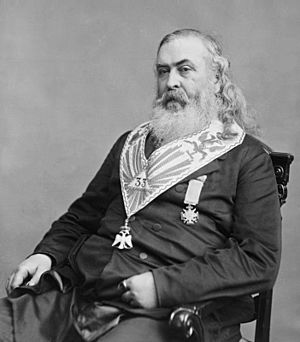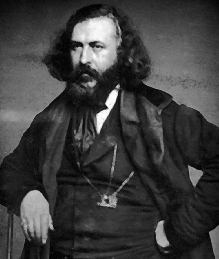Albert Pike facts for kids
Quick facts for kids
Albert Pike
|
|
|---|---|

Pike in Masonic regalia by Mathew Brady
|
|
| Associate Justice of the Arkansas Supreme Court | |
| In office June 8, 1864 – May 28, 1865 |
|
| Appointed by | Harris Flanagin |
| Preceded by | Hulbert F. Fairchild |
| Succeeded by | Charles A. Harper |
| Personal details | |
| Born | December 29, 1809 Boston, Massachusetts, U.S. |
| Died | April 2, 1891 (aged 81) Washington, D.C., U.S. |
| Resting place | Oak Hill Cemetery, Washington, D.C. 38°54′45.9″N 77°03′21.4″W / 38.912750°N 77.055944°W |
| Signature | |
| Military service | |
| Allegiance |
|
| Service | |
| Years of service |
|
| Rank |
|
| Commands |
|
| Battles | |
Albert Pike (born December 29, 1809 – died April 2, 1891) was an important American figure. He was a writer, poet, lawyer, and even a general in the Confederate States Army during the American Civil War. He also served as a judge for the Arkansas Supreme Court for a short time. Pike was very active in the Freemasons, a well-known fraternal organization. He led the Supreme Council, Scottish Rite (Southern Jurisdiction, USA) for many years.
Contents
Early Life and Education
Albert Pike was born in Boston, Massachusetts, on December 29, 1809. He grew up in towns like Byfield and Newburyport, Massachusetts. His family had lived in the area since 1635.
He went to school until he was 15 years old. In 1825, he passed the entrance exams for Harvard University. However, he decided not to go because he couldn't pay the tuition for the first two years. Instead, he taught himself and became a schoolteacher in different towns in Massachusetts.
Pike was a tall and large man, about 6 feet (1.8 meters) tall and weighing around 300 pounds (136 kg). He had long hair and a long beard. In 1831, he left Massachusetts and traveled west. He stopped in Nashville, Tennessee, and then moved to St. Louis, Missouri.
He joined a hunting trip to Taos, New Mexico. During this trip, his horse ran away, so Pike had to walk about 500 miles (800 km) to Taos. After that, he joined another trip to trap animals in New Mexico and Texas. This trip was also tough, and he walked about half of the 1,300 miles (2,100 km) they traveled. He finally arrived at Fort Smith, Arkansas.
Career in Arkansas
Pike settled in Arkansas in 1833. He taught at a school and wrote articles for a newspaper called the Arkansas Advocate. His articles were popular, and he was asked to join the newspaper's team. In 1834, he married Mary Ann Hamilton and bought the newspaper.
Pike became the first reporter for the Arkansas Supreme Court. He also wrote a guide for lawyers. He studied law and became a lawyer in 1837. He was a very good lawyer and represented people in many courts, even the United States Supreme Court starting in 1849.
He also became friends with several Native American tribes in the area. He helped them with their legal claims against the U.S. government. For example, in 1852, he represented the Creek Nation in a land claim case. He also helped the Choctaw and Chickasaw tribes. These connections would become important later during the Civil War.
Pike also supported building a railroad from New Orleans to the Pacific coast. He moved to New Orleans in 1853 to work on this project. He returned to Little Rock in 1857 after helping to get a charter for the railroad from the Louisiana State Legislature.
Before the Civil War, Pike was involved in politics. He joined the Know Nothing Party, which was against immigration and Catholics. He later left the party when it didn't support his views on slavery. He also signed a paper that suggested removing all free African Americans from Arkansas.
Pike continued to write about legal topics and poetry throughout his life. His poems were well-known during his time. In 1859, he received an honorary degree from Harvard University.
Poetry
Albert Pike loved writing poetry from a young age. His first poem, "Hymns to the Gods," was published when he was 23. His poems appeared in magazines and local newspapers. His first collection of poems, Prose Sketches and Poems Written in the Western Country, came out in 1834.
He later put many of his poems together in Hymns to the Gods and Other Poems (1872). After he died, more of his poems were published in books like Gen. Albert Pike's Poems (1900) and Lyrics and Love Songs (1916).
For a while, people thought Pike wrote a famous poem called "The Old Canoe." However, Pike himself said he didn't write it. The real author was Emily Rebecca Page.
Freemasonry
Pike joined the Independent Order of Odd Fellows, another fraternal group, in 1840. Then he joined a Masonic Lodge and became very active in the organization. In 1859, he was chosen to be the Sovereign Grand Commander of the Scottish Rite's Southern Jurisdiction. He held this important position for the rest of his life. He spent a lot of time working on the rituals and traditions of the Freemasons.
In 1871, he published a famous book called Morals and Dogma of the Ancient and Accepted Scottish Rite of Freemasonry. This book helped the Freemasons grow a lot during the 1800s. Pike is still considered a very important and influential Freemason, especially in the Scottish Rite.
Military Service
Mexican–American War
When the Mexican–American War began, Albert Pike joined the Arkansas Mounted Infantry Regiment. He became a captain in June 1846. He fought in the Battle of Buena Vista. Pike left the army in June 1847. He had some disagreements with his commander, Colonel John Selden Roane. This led to a duel between them, but no one was hurt, and they stopped fighting.
After the war, Pike went back to being a lawyer. He moved to New Orleans for a while in 1853. He wrote another book about law, which made him more respected among other lawyers. He returned to Arkansas in 1857.
Pike believed that states should have more power than the national government. He supported the idea that Southern states could leave the Union if they felt they were being treated unfairly.
American Civil War
In 1861, Albert Pike wrote the words to a song called "Dixie to Arms!" At the start of the American Civil War, Pike was sent by the Confederacy to talk with Native American nations. He made several agreements, including an important one with Cherokee chief John Ross in 1861. Ross agreed to support the Confederacy, which promised the tribes their own state if the Confederacy won.
Pike became a brigadier general in the Confederate States Army in November 1861. He was put in charge of the Indian Territory. He trained three Confederate regiments of Native American cavalry. Their loyalty to the Confederacy was not always strong.
Pike's unit was part of the Battle of Pea Ridge in March 1862. They were successful at first but were later defeated. Pike often had disagreements with his superior officers. He even wrote a letter to Jefferson Davis, the Confederate president, complaining about his direct commander.
Pike faced accusations from a higher-ranking officer and was ordered to be arrested. He believed the order was wrong and escaped into the Arkansas hills. He resigned from the Confederate army in July 1862. His resignation was accepted in November, and he was allowed to go back to Arkansas.
As Union troops moved towards the state capital in 1863, the State Supreme Court moved to Washington, Arkansas. Pike was appointed as a judge there.
After the war, Pike moved to New York City and then briefly to Canada. In 1865, he asked President Andrew Johnson for a pardon. He said he wanted to live peacefully, practice law, and help others. President Johnson pardoned him in April 1866.
Later Life and Death
During a political conflict in Arkansas called the Brooks-Baxter War, Pike was one of the lawyers who spoke for Elisha Baxter.
Pike died on April 2, 1891, in Washington D.C., at the age of 81. He was buried at Oak Hill Cemetery. In 1944, his remains were moved to the House of the Temple, which is the headquarters of the Scottish Rite Freemasons. This building has many items and memorials related to Pike, including his personal library.
Legacy
A memorial statue of Albert Pike was put up in 1901 in Washington, D.C. The location was chosen because Pike had worked to protect Native American rights. The statue showed him as a private citizen and a Freemason. He was the only former Confederate military officer with an outdoor statue in Washington, D.C. In June 2020, protestors tore down the statue and set it on fire because of Pike's connection to the Confederacy.
The Albert Pike Memorial Temple is an old Masonic lodge in Little Rock, Arkansas. It is listed on the National Register of Historic Places.
The Albert Pike Highway was a long road, over 900 miles (1,400 km), that stretched from Hot Springs, Arkansas, to Colorado Springs, Colorado. It crossed the Ozark Mountains and went through several cities.
Selected Books
- Indo-Aryan Deities and Worship as Contained in the Rig-Veda (1872)
- Morals and Dogma of the Ancient and Accepted Scottish Rite (1872)
- Book of the Words (1874)
- Reprints of Old Rituals (1879)
- Esoterika (1887)
Images for kids
-
The Albert Pike Memorial, torn down by rioters on June 19, 2020
See Also
- List of Arkansas adjutants general
- List of Confederate States Army generals
- List of Freemasons
- List of people from Boston
- List of people from Little Rock, Arkansas
 | Valerie Thomas |
 | Frederick McKinley Jones |
 | George Edward Alcorn Jr. |
 | Thomas Mensah |



